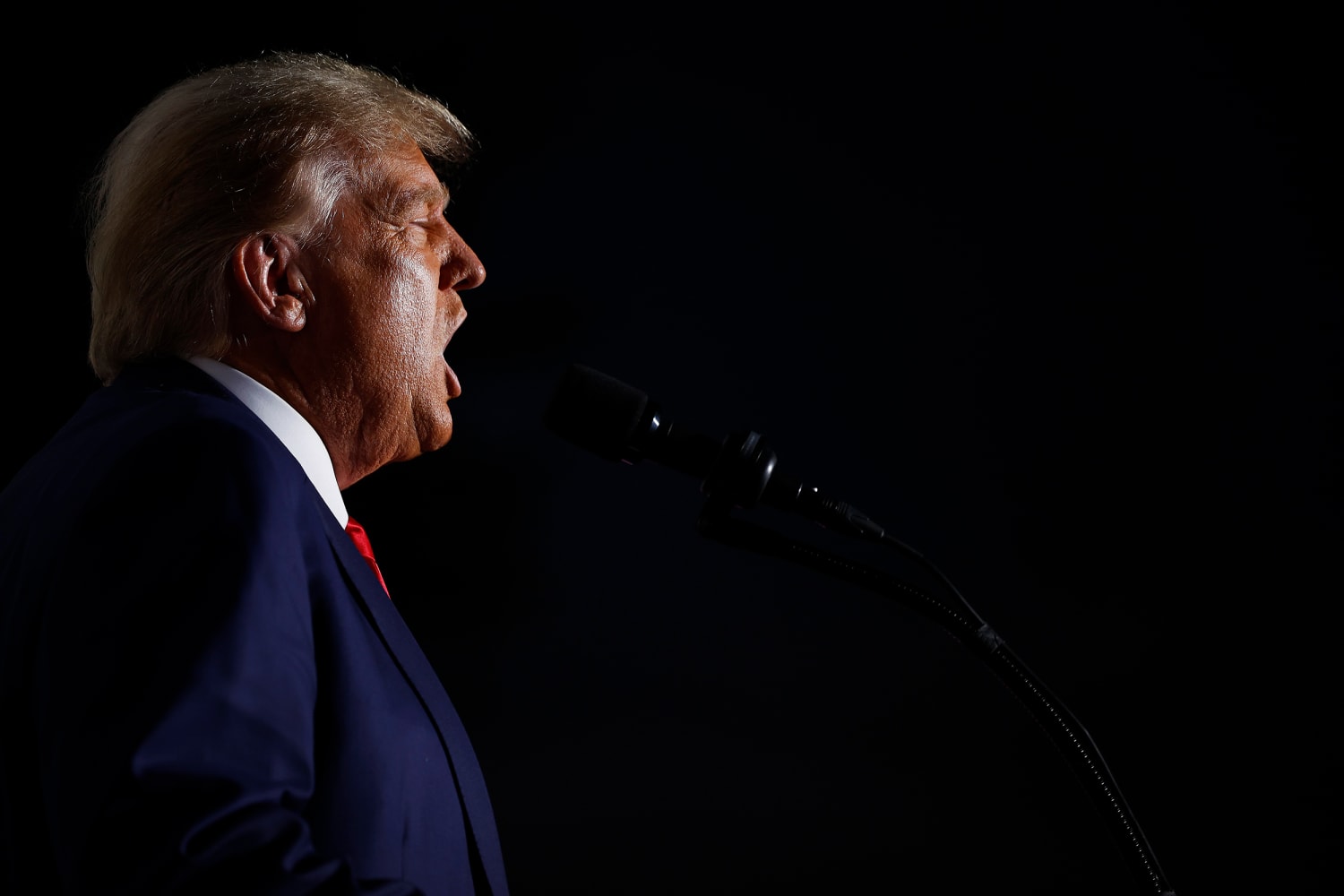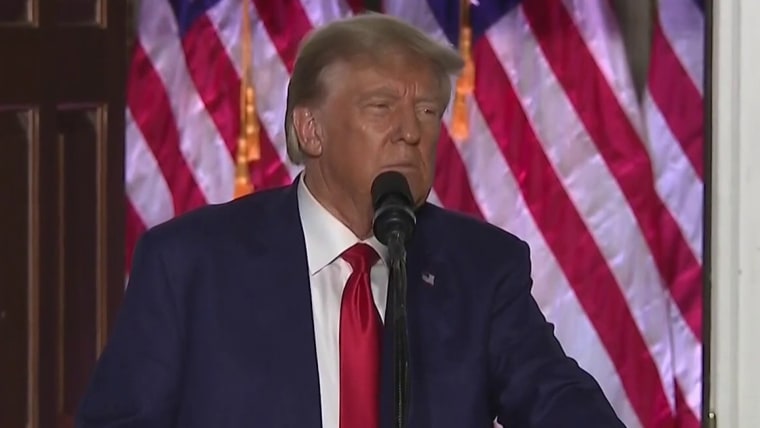WASHINGTON — Congressional Republicans are at odds about whether to support their party’s presidential front-runner, Donald Trump, next year if he’s convicted of federal crimes.
While some GOP lawmakers say they couldn’t support a convicted felon for the White House, others are reluctant to close the door. The divisions scramble ideological lines, with some of the most right-leaning Republicans expressing unease with backing Trump after a still-hypothetical conviction after he became the first former president to be indicted federally, while various center-right GOP members say their responses would depend on circumstances.
Rep. Tim Burchett of Tennessee, one of the most conservative House Republicans, said he would not be OK having a convicted felon as the GOP’s 2024 nominee.
“No. Honestly, on the surface, I wouldn’t. It doesn’t look good,” Burchett said. “But let’s see what the conviction says. Let’s see if he is convicted.”
Rep. Ken Buck, R-Colo., who has criticized GOP leaders from the right, said a felony conviction would be a deal breaker.
“I certainly won’t support a convicted felon for the White House,” Buck said Tuesday on CNN.
Under the U.S. legal system, Trump is presumed innocent until proven guilty. He has pleaded not guilty to all 37 counts involving mishandling of classified documents.
Most of the 18 House Republicans who represent competitive districts that President Joe Biden won in 2020 have remained silent or avoided discussing the charges. Democrats are seeking to use the issue against them politically by casting the Trump-supporting GOP as a party that stands against law enforcement.
Rep. Don Bacon, R-Neb., is the exception in that group, saying “there’s no way to defend” Trump’s alleged conduct as laid out in the indictment.
Other Republicans in prominent positions are keeping their options open, for now, when they are asked whether a criminal conviction would cost Trump their support in the 2024 general election.
“I’ll cross that bridge when it comes,” said Rep. Cathy McMorris Rodgers, R-Wash., who chairs the powerful Energy and Commerce Committee.
Rep. Garret Graves, R-La., a close ally of Speaker Kevin McCarthy, R-Calif., who helped negotiate the debt ceiling law with the White House, said a potential felony conviction “would impact” his ability to support a presidential candidate, as long as that person “went through a legitimate due process.”
Graves added: “I’m going to say that again: a legitimate due process.”
Behind the scenes, in the quiet corridors on Capitol Hill, there is more consternation about the possibility that a convicted criminal could be their party’s presidential nominee.
“I do think there are a fair number of my colleagues who would think that, if the charges are true, that would be a major, major problem,” said a House Republican lawmaker who is still reading through the indictment and requested anonymity to speak frankly about the party’s thorny dynamics involving Trump.
House Armed Services Committee Chairman Mike Rogers, R-Ala., who regularly has access to reams of classified information, also is trying to avoid the issue.
“We’ll let the courts play out, and I’ll figure out what to do after that. I’m not getting involved in this,” Rogers said in an interview. Asked whether he has concerns about the underlying allegations in the indictment, he replied: “I don’t have a position.”
Most Republicans, including McCarthy and many of his top deputies, are attacking the indictment and indicating that the outcome of the case would have little impact on their thinking.
Rep. Byron Donalds, R-Fla., who has endorsed Trump for president, said he’ll have to wait and “watch what happens” before he decides whether a conviction would cause him to pull his support.
“It all depends on what actually happens. I’m not committed to that, because I’ve seen it in other instances where courts do something and they are wrong,” Donalds said.
Rep. Bob Good, R-Va., a member of the ultraconservative Freedom Caucus, said he has endorsed Florida Gov. Ron DeSantis for president “because I think he gives us our best chance to win in ’24.” But he said Trump “was an outstanding president; I would enthusiastically support him again,” regardless of a potential conviction, and he called the charges a political attack.
“I will support whomever our nominee is. And this is a ridiculous, politically motivated attack on President Trump that is relentless and has been relentless for the last seven or eight years,” Good said.
The charges don’t appear to have affected Trump’s strong support within the GOP base, according to a Quinnipiac University poll conducted in the immediate aftermath of Trump’s indictment and released Wednesday, which found Trump leading DeSantis, his nearest rival, by 53% to 23% among Republican voters.
Sen. Tommy Tuberville, R-Ala., who traveled to New Jersey on Tuesday to attend Trump’s post-arraignment speech, is standing by his support for Trump in 2024 and downplaying the indictment. “It’s all politics. He understands that. It’s not his first rodeo,” said Tuberville, who added that he had dinner with Trump on Tuesday.
“He’s disappointed he got indicted,” said Tuberville, who insisted Trump is being targeted “for something everybody else has done” in terms of mishandling classified information.
Rep. Tony Gonzales, R-Texas, a member of the bipartisan Problem Solvers Caucus, was reluctant to criticize Trump. Instead, Gonzales, who worked 20 years as a Navy cryptologist with top-secret clearance, said he took issue with the way service members have been prosecuted for mishandling classified material while several politicians have been let off the hook.
“I lump them all together. I lump Trump, Clinton, Biden, Pence, anybody who’s mishandled classified material,” Gonzales said. “It seems that it’s OK if you’re a political figure, but if you’re an everyday, average American protecting our nation, which I was for 20 years, it’s a different set of rules.”
Rep. George Santos, R-N.Y., who knows what it’s like to be indicted by federal prosecutors, remains a vocal Trump defender. He was charged last month with 13 counts, including wire fraud, money laundering and making numerous false statements to win election to Congress and enrich himself. But he declined to entertain hypotheticals if Trump gets convicted.
“We’re just gonna do hyperboles now? Woulda, coulda, shoulda? Ask me a question with facts,” Santos said in a brief interview off the House floor. “I don’t know the future. Do you know the future? I support the president.”
Sen. Mitt Romney, R-Utah, who has said Trump “brought these charges upon himself” and is the only Republican senator who voted twice to convict Trump on impeachment charges, said it would be bad if a major political party nominated a convicted felon for president.
“Obviously, that would be an alarming thing for the world. I think that it makes it much more difficult for former President Trump to get re-elected. Winning the primary should not be hard for him. Winning the general would be a tall lift, depending, of course, on other circumstances that may develop,” Romney said. “But there will be people in the center, if you will — Republicans who voted for Donald Trump in the past but who are simply too concerned about the conduct to have to look the other way and vote again for him.”
Source: | This article originally belongs to Nbcnews.com











